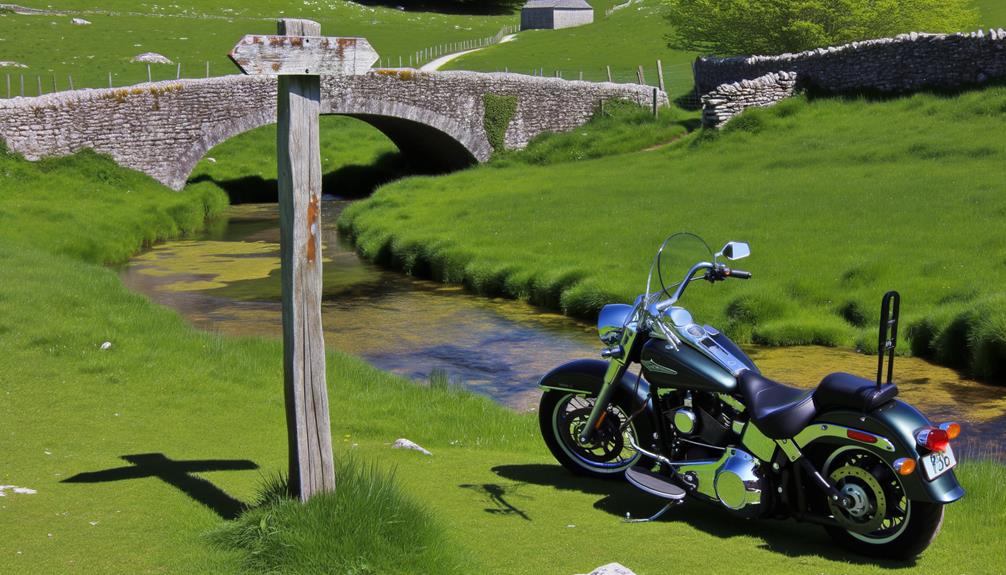Meaning of the Name Harley
The name Harley originates from Old English, combining 'hār' meaning 'gray' or 'hare' and 'lēah' meaning 'wood' or 'meadow.' Historically a surname, Harley has evolved into a given name, reflecting dynamic naming conventions. Associated with rural England, it symbolizes landscapes rich in natural elements.
Once primarily male, it now enjoys popularity as a unisex name, mirroring shifts toward gender inclusivity. Its cultural resonance spans literature, media, and notable figures, highlighting its multifaceted appeal.
Examining Harley's evolution reveals fascinating insights into societal attitudes and linguistic trends.

Key Takeaways
- Harley originates from Old English, meaning 'hare meadow' or 'gray wood.'
- The name reflects pastoral and natural elements, associated with rural England.
- Historically a male name, Harley is now widely recognized as unisex.
- Media and pop culture have popularized Harley, enhancing its modern appeal.
- Harley symbolizes versatility and adaptability, fitting various cultural contexts.
Etymology of Harley
The name Harley originates from Old English, derived from the words 'hār' meaning 'gray' or 'hare' and 'lēah' meaning 'wood' or 'meadow.'
This compound structure suggests a geographical connotation, often referring to a place characterized by such features. The etymology reflects linguistic elements prevalent in Anglo-Saxon toponyms, where natural landmarks played a significant role in nomenclature.
'hār' could also imply 'hoary,' an Old English term for 'gray,' further emphasizing an aged or venerable landscape. The suffix 'lēah' is recurrent in English place names, indicating a clearing or pasture within a wooded area.
Harley encapsulates a descriptive essence, merging natural and cultural elements intrinsic to early English settlements. This analysis underscores the multifaceted origins inherent in English names.
Historical Background
The historical background of the name Harley can be traced to its Old English origins, signifying a meadow or clearing. Initially used as a surname, Harley shifted into a given name, reflecting broader societal patterns of surname adoption.
This evolution underscores the dynamic nature of naming conventions and their cultural implications.
Old English Origins
Rooted in Old English, the name Harley originates from the words 'hara' meaning hare and 'leah' meaning wood or clearing. This etymology provides a vivid picture of the natural landscape that the name evokes.
Imagining the historical context, one can visualize:
- Hares darting through a clearing, emblematic of the wildlife in ancient England.
- Woodlands rich with foliage, representing the dense forests that once dominated the countryside.
- Open clearings, serving as communal spaces in early settlements, providing both resources and refuge.
Such imagery underscores the Old English origins of Harley, encapsulating the pastoral essence of early rural life.
This historical backdrop not only highlights the name's meaning but also its cultural and environmental significance in Old English society.
Surname to First Name
During the shift from surname to first name, Harley exemplifies a broader trend in the evolution of naming conventions. Initially an Anglo-Saxon surname derived from the Old English words 'hara,' meaning hare, and 'leah,' meaning meadow or clearing, Harley was traditionally used to identify individuals by their geographical origins.
Over time, the practice of using surnames as first names gained popularity, driven by cultural shifts and the desire for unique personal identifiers. This transformation aligns with a larger societal movement toward individuality and the personalization of names.
Geographic Origins
Harley, as a name, can be traced back to its origins in Old English, where it was derived from elements meaning 'hare' and 'wood' or 'meadow.' This etymological background provides insight into the geographic context where the name first appeared.
Specifically, the name is associated with rural and pastoral settings in England, reflecting a landscape rich in natural elements.
- Hare: Symbolizing the presence of wildlife, indicating a thriving ecosystem.
- Wood: Denoting forested areas abundant with trees and natural resources.
- Meadow: Representing open grasslands used for grazing, indicative of agricultural activity.
These elements paint a picture of an environment where natural resources were pivotal, shaping the lives and identities of the inhabitants.
Harley in Literature
The name Harley has been employed in literature to denote both complex characters and significant symbolic undertones.
Analyzing the characterizations, Harley often represents multifaceted traits ranging from rebellion to vulnerability.
Moreover, the symbolic use of Harley frequently underscores themes of duality and transformation, reflecting broader societal narratives.
Harley as a Character
Exploring the literary embodiment of Harley reveals a multifaceted character whose interpretations vary widely across different works and genres. In literature, Harley often emerges as a persona rich with complexity and depth. This character can be analyzed through three primary dimensions:
- Heroic Archetype: Harley is frequently portrayed as a protagonist whose journey begins on a quest for justice and self-discovery.
- Tragic Figure: In various narratives, Harley embodies the tragic hero, burdened by flaws and fate, evoking a sense of pathos.
- Comedic Relief: Harley's presence often brings levity, characterized by wit and humor, serving as a counterbalance to more serious themes.
These diverse portrayals underscore Harley's adaptability and the name's enduring literary significance.
Symbolism of Harley
In literature, the name Harley often serves as a potent symbol encapsulating themes of transformation, resilience, and duality.
Characters named Harley frequently embody significant personal evolution, mirroring the complexities and vicissitudes of human experience. This duality is evident in contrasting portrayals, from noble heroes to morally ambiguous figures, thereby underscoring Harley's symbolic versatility.
The resilience associated with the name is often depicted through characters who navigate adversity with an indomitable spirit.
This multifaceted symbolism allows Harley to serve as a literary device that enriches narrative depth, inviting readers to explore nuanced character arcs and moral ambiguities.
Consequently, the name Harley transcends its linguistic origins, becoming a rich repository of thematic significance in literary contexts.
Cultural Significance
Harley has evolved into a culturally significant name, embodying both historical and contemporary connotations across various societies. Its resonance can be observed in diverse cultural contexts:
- Literature and Media: Harley Quinn, a prominent character in DC Comics, symbolizes both chaos and intelligence, adding layers of complexity to the name.
- Motorcycle Culture: Harley-Davidson, an iconic American motorcycle brand, evokes images of freedom and rebellion, enhancing the name's rugged appeal.
- Social Identity: The name Harley is increasingly adopted across genders, reflecting modern trends towards gender-neutral naming conventions.
Each of these elements contributes to Harley's multifaceted cultural significance, illustrating its adaptability and enduring appeal. By analyzing its representations, one can appreciate Harley's dynamic presence within global cultural landscapes.
Popularity Over Time
Harley's cultural significance is mirrored in its fluctuating popularity over time, revealing intriguing patterns in its adoption and usage.
Historically, the name Harley experienced varied levels of utilization, often correlating with broader societal trends and cultural shifts. In the early 20th century, Harley saw moderate use, but its popularity surged mid-century, influenced by phenomena such as the rise of Harley-Davidson motorcycles.
The name's appeal waned somewhat in subsequent decades, reflecting changing naming conventions and cultural tastes. However, the late 20th and early 21st centuries witnessed a resurgence, potentially driven by media representations and renewed cultural relevance.
This cyclical pattern of popularity underscores the dynamic interplay between cultural artifacts and naming practices, illustrating the evolving nature of societal influences on nomenclature.
Harley and Gender
The name Harley exhibits a notable degree of gender fluidity, having been adopted for both males and females across different eras and cultures. This dual-gender utility can be attributed to several factors:
- Historical Usage: Initially, Harley was mainly a male name, derived from Old English origins.
- Modern Trends: In contemporary times, it has become increasingly popular as a unisex name, reflecting broader societal shifts towards gender inclusivity.
- Cultural Influences: Media and popular culture have played a pivotal role in promoting Harley as a name suitable for any gender.
In essence, the name Harley serves as a fascinating case study in the evolution of naming conventions, providing insights into how societal norms influence personal identity through nomenclature.
Famous Namesakes
Numerous notable individuals bearing the name Harley have made significant contributions across various fields, showcasing the name's versatility and wide appeal.
Historically, Harley Granville-Barker, an influential English actor, director, and playwright, revolutionized early 20th-century theater with his innovative ideas.
In the domain of sports, Harley Flanagan, a renowned musician and mixed martial artist, exemplifies the name's reach beyond traditional boundaries.
The entertainment industry features Harley Quinn Smith, an emerging actress with a growing body of work, further emphasizing the name's contemporary relevance.
Each of these individuals, through their varied accomplishments, demonstrates the broad spectrum of influence held by those with the name Harley, underscoring its adaptability and enduring charm across generations and professional domains.
Modern-Day Perception
Building on the notable achievements of individuals named Harley, contemporary perceptions of the name reflect its evolving cultural significance and multifaceted appeal. Modern-day usage of Harley is marked by three key trends:
- Gender Neutrality: Increasingly recognized as a unisex name, Harley transcends traditional gender boundaries, resonating with both male and female identities.
- Pop Culture Influence: Popular characters such as Harley Quinn have imbued the name with a sense of edginess and charisma, enhancing its appeal in media and entertainment.
- Global Reach: The name's adoption across various cultures and regions signifies its universal charm and adaptability, suggesting a broader acceptance and appreciation of its versatility.
These factors collectively underscore the dynamic and inclusive nature of the name Harley in contemporary society.
Conclusion
In summation, the name Harley, with its multifaceted etymology and historical roots, emerges as a veritable chameleon in the annals of onomastics. From its bucolic origins to its literary and cultural imprints, Harley has navigated the vicissitudes of time with aplomb.
Its shifting gender associations and oscillating popularity underscore society's capricious nature. Therefore, Harley stands as a proof of the human penchant for imbuing nomenclature with layers of unwarranted complexity and undue gravitas.






